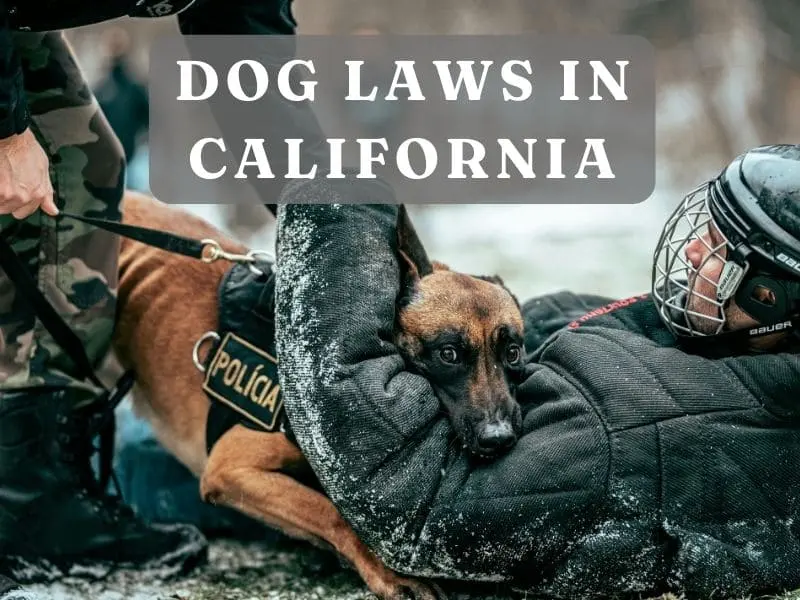Dog Laws in California
Understanding dog laws in California is crucial for pet owners, as it helps ensure the safety and well-being of both the animals and the community. These regulations are designed to protect dogs from mistreatment, prevent attacks, and establish the responsibilities of dog owners.
In California, dog laws cover a variety of areas including licensing, leash requirements, noise control, spaying and neutering, and the consequences of dog bites. Licensing is a fundamental aspect, as it aids in the identification and vaccination tracking of pets. Leash laws are enforced to prevent dogs from roaming freely, which can lead to accidents or aggressive encounters. Noise control ordinances address excessive barking, which can be a nuisance to neighbors.
Spaying and neutering regulations are aimed at controlling the pet population and reducing the number of homeless animals. Lastly, California has strict liability laws for dog bites, holding owners accountable for their pets’ actions, regardless of the animal’s past behavior.
For dog owners, understanding these laws is not just about compliance; it’s about fostering a harmonious environment where pets and people can coexist peacefully. By being informed, owners can prevent legal issues and contribute to a safer community.
Table of Contents
Dog Bite Laws California
Dog bite incidents can be traumatic and have serious consequences. In California, the laws surrounding dog bites are designed to protect victims and hold dog owners accountable for the actions of their pets. Here’s an in-depth look at the dog bite laws in California.
Strict Liability for Dog Owners
California is a “strict liability” state when it comes to dog bites. This means that a dog owner is liable for damages if their dog bites someone, regardless of whether the owner knew the dog had the propensity to bite. The law applies to bites that occur in public places or while the victim is lawfully on private property.
What Constitutes a Dog Bite?
Under California law, a bite is not limited to instances where the skin is broken. If a dog’s teeth clamp around a person, it is considered a bite, even if there is no puncture or tear of the skin.
Exceptions to Strict Liability
There are exceptions to the strict liability rule. For instance, dog owners are not liable for bites to trespassers, as they are not lawfully on the property. Additionally, the law does not apply to military or police dogs performing their duties, nor does it typically apply to veterinarians or vet assistants bitten during treatment.
Liability for Non-Bite Injuries
While strict liability covers bites, dog owners may also be held responsible for other injuries caused by their dogs, such as when a dog knocks someone over. In these cases, the victim must prove negligence on the part of the owner.
Provocation and Comparative Negligence
If a dog bites in response to being provoked, the owner may not be held liable. Furthermore, if the victim’s negligence contributed to the incident, the compensation may be reduced accordingly.
Statute of Limitations
Victims of dog bites in California have a limited time to file a lawsuit. The statute of limitations is generally two years from the date of the bite.
Compensation for Dog Bites
Victims of dog bites can seek compensation for various damages, including medical expenses, lost wages, pain and suffering, and more. The owner’s homeowner’s insurance policy often covers these costs.
Dangerous Dogs and Euthanasia
California law allows for a dog to be declared dangerous if it has been involved in specific aggressive behaviors. In extreme cases, such as when a dog has killed a person, the dog may be euthanized.
Preventing Dog Bites
Dog owners in California can take steps to prevent bites, such as socializing and training their dogs, securing them properly, and obeying local leash laws. By being proactive, owners can reduce the likelihood of bites and the associated legal consequences.
Dog Barking and Noise Laws in California
Dog Barking and Noise Laws in California are a significant aspect of the state’s legal framework, aiming to balance the rights of pet owners with the peace and comfort of the community. This comprehensive guide will delve into various facets of these laws, providing insights into local ordinances, the definition and implications of excessive barking, dispute resolution, technological solutions, and community guidelines for effective communication.

Local Ordinances on Dog Barking and Noise
California’s approach to dog barking and noise is not uniform across the state; it varies by municipality. Generally, local ordinances define the acceptable level of noise and the duration for which a dog can bark legally. For instance, in some areas, a dog barking for more than half an hour is considered a nuisance. In Contra Costa County, residents can file a complaint if a dog barks on and off for 24 hours.
Defining Excessive Barking and Its Legal Implications
Excessive barking in California is defined as a nuisance act that disturbs or annoys a reasonable person. It is characterized by continuous, repetitive, unnecessary, and excessive barking over an extended period, substantially interfering with another individual’s peace. Legal action can be taken if the barking persists despite attempts to resolve the issue amicably.
Dispute Resolution and Mediation for Noise Complaints
Before filing a formal complaint, it is recommended that individuals attempt to resolve the issue by speaking directly with the dog’s owner. If this fails, mediation services may be sought. In some cases, a court-approved notice must be given to pet owners before legal proceedings commence.
Technological Solutions and Their Legal Status
Technological solutions like anti-bark collars or sound-emitting devices are available to help control a dog’s barking. The legal status of these devices varies, and it’s important to ensure they are humane and comply with animal welfare laws.
Community Guidelines and Effective Communication Strategies
Communities may establish guidelines to encourage responsible pet ownership and foster good neighborly relations. Effective communication strategies can include setting clear expectations, discussing concerns openly, and working collaboratively to find solutions that respect both the pet owners’ and neighbors’ rights.
Dog Poop Disposal Laws in California
Dog Poop Disposal Laws in California are a critical environmental and public health issue. The state has implemented regulations to ensure the proper disposal of pet waste, and compliance is essential for maintaining public spaces clean and preventing the spread of disease. This comprehensive guide will cover the key aspects of these laws, including public health concerns, environmental impact, regulations in different areas, compliance, innovations in waste management, and the role of local governments and community involvement.
In California, dog poop disposal laws are designed to maintain public hygiene and environmental cleanliness. Here’s a summary of the key regulations:
- Public Spaces: Dog owners must pick up after their pets in all public areas, including parks, sidewalks, and beaches. Owners are required to carry bags or other suitable containers to collect the waste and place it in designated trash receptacles.
- Fines: Failure to comply with dog poop disposal laws can result in fines ranging from $100 to $1,000, depending on the severity of the offense and the specific city or county regulations.
- Private Property: Owners must also dispose of their pet’s waste on their own property or in designated areas within their community, such as pet waste disposal stations.
- Los Angeles Specific: In Los Angeles, it is unlawful for the owner or person having custody of any dog to fail to immediately remove and dispose of in a sanitary manner, any feces deposited by such dog upon public or private property.
- Waste Removal: A person who owns or has custody of a dog is required to remove the dog’s feces immediately from public property or private property not owned or possessed by the owner or custodian of the dog. The waste must be disposed of in a sanitary manner.
- Exceptions: The laws generally do not apply to a blind person being accompanied by a guide dog.
- Local Variations: While there are state-wide regulations, individual cities, counties, or municipalities may have additional or differing laws regarding dog poop disposal.
Public Health Concerns and Environmental Impact
Dog waste is not only unsightly but also a significant health hazard. It can contain harmful bacteria and parasites like E. coli, salmonella, and giardia, which can contaminate water sources and pose a risk to humans and wildlife. Moreover, dog feces are a contributor to nutrient pollution, leading to algal blooms that deplete oxygen in water bodies, harming aquatic life.
Regulations on Dog Waste in Urban and Rural Areas
California’s dog poop laws require owners to clean up after their pets in all public areas, including parks, sidewalks, and streets. In urban areas, where the concentration of dogs is higher, the impact of not complying with these laws is more immediate and visible. Rural areas, while not as densely populated, still require proper waste management to protect the environment.
Compliance with the Clean Up After Your Pet Laws
The California Dog Poop Law mandates that dog owners carry bags or other means of waste disposal when walking their dogs. Failure to comply can result in fines ranging from $100 to $1,000, depending on the city or county regulations. Compliance is not just about avoiding fines; it’s about being a responsible member of the community.
Innovations in Dog Waste Management
Innovative solutions for dog waste management are on the rise. Biodegradable bags, in-ground waste disposal systems, and even dog waste composting are becoming more popular. These solutions aim to reduce the environmental footprint of pet waste and make disposal more convenient for dog owners.
Role of Local Governments and Community Involvement
Local governments play a crucial role in enforcing dog poop disposal laws and educating the public about the importance of compliance. Community involvement is also key. Neighborhood associations and volunteer groups often organize clean-up events and help maintain pet waste stations.
Dog licensing Laws in California
Dog licensing is a critical component of responsible pet ownership in California. The state’s laws are designed to ensure that dogs are properly registered, identified, and vaccinated, contributing to public health and safety. Here’s an extensive overview of the dog licensing laws in California:
Mandatory Licensing
In California, all dogs over the age of four months must be licensed. This is a state-wide requirement, and failure to comply can result in penalties or fines.
Rabies Vaccination
A current rabies vaccination is required for licensing. Dog owners must provide proof of their dog’s rabies vaccination when applying for a license, as this is a crucial measure to prevent the spread of the disease.
License Renewal
Dog licenses in California are typically valid for one year and must be renewed annually. Some jurisdictions may offer multi-year licenses or lifetime licenses for older dogs or those with permanent identification, such as microchips.
License Tags
Upon licensing, dogs are issued a tag that must be securely fastened to their collar or harness and worn at all times. This tag serves as a quick means of identification and proof of vaccination.
Spaying and Neutering
Some California cities and counties require that dogs be spayed or neutered. For example, Los Angeles County has such a requirement, while San Diego County does not mandate it but charges higher licensing fees for unaltered dogs.
Microchipping
While not a state-wide requirement, many local jurisdictions in California require dogs to be microchipped as part of the licensing process. Microchipping provides a permanent form of identification that can help reunite lost pets with their owners.
Exemptions and Exceptions
There are exemptions to licensing requirements for guide dogs, service dogs, and, in some cases, dogs belonging to non-resident military personnel stationed in California.
Enforcement and Penalties
Local animal control agencies are responsible for enforcing dog licensing laws. Penalties for non-compliance can include fines and, in some cases, impoundment of the unlicensed dog until licensing requirements are met.
Supporting Local Animal Control and Shelters
The fees collected from dog licensing go towards funding local animal control agencies and shelters. These funds support programs that promote responsible pet ownership, provide medical care to stray animals, and assist in the adoption process.
Benefits of Licensing Your Dog
Licensing your dog has several benefits. It helps in reuniting lost dogs with their owners, ensures that dogs are vaccinated against rabies, and supports local animal control efforts. Additionally, licensed dogs are often given a longer hold period at shelters if they are lost, increasing the chances of being reunited with their owners.
Local Variations
Dog owners should be aware that while there are state-wide regulations, individual cities, counties, or municipalities may have additional or differing laws regarding dog licensing. It is essential to check with local authorities for specific requirements.
Dog licensing and registration
Dog licensing and registration are essential components of responsible pet ownership and play a significant role in the well-being of dogs and communities. Here’s an in-depth look at the necessity of dog licensing, the procedures involved, the role of microchipping, and the benefits it brings.
The Necessity of Dog Licensing and Registration
Licensing and registration are legal requirements in many places, including California. They serve several important purposes:
- Public Health: Licensing ensures that all dogs are vaccinated against rabies, protecting both the pet population and the public.
- Identification: A license tag helps in the quick identification and return of lost pets to their rightful owners.
- Accountability: It encourages responsible pet ownership by holding owners accountable for their pets’ actions and welfare.
Fees and Procedures for Obtaining a Dog License
The fees for obtaining a dog license vary by county in California. For instance, in Los Angeles County, the yearly license fee for an unaltered dog is $60, while the fee for an altered one is $20. To obtain a license, owners must provide proof of rabies vaccination and, in some cases, proof of spaying or neutering. Licenses can be purchased online, by mail, or in person at local animal care centers.
The Role of Mandatory Microchipping in Identification
Microchipping is a permanent form of identification that can greatly increase the chances of a lost pet being reunited with its owner. A microchip is a small device implanted under the dog’s skin that contains a unique identification number. When scanned, this number can be used to retrieve the owner’s contact information from a database.
Renewing Dog Licenses and Replacing Lost Tags
Dog licenses in California typically need to be renewed annually. If a tag is lost, replacements can be ordered online, by mail, or in person, with fees varying by jurisdiction. The renewal process ensures that all information is up-to-date and that dogs continue to be legally protected and identifiable.
Advantages of Licensing for Dogs and Communities
Licensing offers numerous benefits:
- Safety and Reunification: Licensed dogs are more likely to be returned home if lost.
- Support for Animal Shelters: License fees help fund local animal shelters and welfare programs.
- Promotion of Health: Licensing promotes the health of the pet population by ensuring dogs are vaccinated.
- Community Well-being: Licensing contributes to the overall well-being of the community by ensuring dogs are properly cared for and identified.
Dog Leash Laws in California
California is known for its diverse landscapes and dog-friendly communities. However, with the privilege of having our furry friends accompany us comes the responsibility of adhering to local laws and regulations. One of the most important regulations for dog owners in the Golden State is the leash law. Understanding and complying with these laws not only ensures the safety of our pets but also of the communities we live in.

Statewide Leash Requirements
In California, there is a general expectation that dogs will be kept on a leash when in public spaces. This includes parks, beaches, sidewalks, and any other areas where people congregate. The leash used must not exceed six feet in length and should be securely attached to a collar or harness.
Local Ordinances and Variations
While California does not have a universal leash law, most counties and municipalities have enacted their own ordinances. For instance, Los Angeles County requires all dogs to be restrained on substantial leashes not exceeding six feet in length while on public property or shared areas of private property. It’s crucial for dog owners to familiarize themselves with the specific leash laws applicable in their local area.
Exceptions to the Rule
There are certain exceptions to the leash law in California. Service animals, law enforcement animals, and dogs in obedience training may be exempt from traditional leash requirements. Additionally, some public places like dog parks or designated dog beaches may allow dogs to be off-leash.
Consequences of Non-Compliance
Failure to comply with leash laws can result in fines and, in some cases, civil liability if an unleashed dog causes harm. Dog owners in California are strictly liable for damages if their dog bites someone, regardless of the dog’s previous behavior or the owner’s knowledge of such behavior.
The Importance of Leash Laws
Leash laws are in place to protect both people and animals. They prevent dogs from running at large, which can lead to accidents or altercations with other animals and people. By keeping dogs on a leash, owners can maintain control over their pets and prevent potentially dangerous situations.
Smart Leashes and Technology
With advancements in technology, smart leash systems have been introduced. These systems often include GPS tracking and geofencing, aiding pet owners in complying with leash laws while ensuring their dog’s safety.
California’s Dangerous Dog Laws
California takes the safety of its citizens and the behavior of dogs within its state very seriously. The laws surrounding dangerous dogs are designed to prevent attacks and ensure public safety. This guide will provide you with a comprehensive understanding of what constitutes a dangerous dog in California and the legal implications for owners.
Definition of a Dangerous Dog
In California, a dog may be deemed “potentially dangerous” or “vicious” based on specific behaviors. A “potentially dangerous dog” is one that has, without provocation:
- Engaged in aggressive behavior that forced people to defend themselves.
- Bitten a person, causing a non-severe injury.
- Killed or injured a domestic animal twice within the last 36 months.
A “vicious dog” is one that, without provocation, has inflicted severe injury on a person or killed a person.
Legal Responsibilities of Dog Owners
Owners of dogs that have been labeled as potentially dangerous or vicious have certain legal obligations, including but not limited to:
- Keeping the dog indoors or in a secure, fenced yard.
- Muzzling and leashing the dog when outside the enclosure.
- Obtaining a proper license for a potentially dangerous dog.
- Spaying or neutering the dog.
Consequences of Violating Dog Laws
Failure to control a dangerous dog in California can lead to criminal charges under Penal Code § 399 PC. If a person is killed or seriously injured as a result of an owner’s failure to control their dangerous dog, the owner may face felony charges.
Dog Bite Liability
California imposes strict liability on dog owners for bites, regardless of the dog’s previous behavior or the owner’s knowledge of such behavior. This means that if a dog bites someone, the owner is liable for damages.
Preventive Measures and Rehabilitation
California law allows for the euthanization of a dangerous dog if it poses a significant threat to the public. However, there are also provisions for the rehabilitation of potentially dangerous dogs, which may include training and behavioral assessments.
Local Ordinances
It’s important to note that local municipalities may have additional regulations regarding dangerous dogs. Dog owners should check with their local animal control or government offices for any specific rules that apply to their area.
Dog Health and Welfare Laws in California
California is at the forefront of animal welfare, with comprehensive laws designed to protect the health and well-being of dogs. Here’s a detailed list of dog health and welfare laws in California:

Vaccination and Licensing
- All dogs must be vaccinated against rabies and have a current license issued by their local animal control authority.
Animal Welfare Legislation
- SB 879, the PET (Prohibiting Extraneous Testing) Act, prohibits toxicity testing on dogs and cats for pesticides, chemical substances, and other products, with certain exemptions.
- AB 1648 requires kennel owners to create a natural disaster evacuation plan as a condition for obtaining a kennel license or permit.
- AB 1290 clarifies that stealing or taking someone else’s companion animal is considered theft.
- SB 774 facilitates the emotional support dog certification process for homeless individuals.
- AB 2723 expands microchip registration requirements for dogs and cats to support the return of lost pets to their owners and deter theft.
Investment in Animal Shelters
- The state budgets for 2021-22 and 2020-21 included a $50 million investment for a statewide Animal Shelter Assistance Program administered by UC Davis to work toward the state’s no-kill goal.
Retail Sale and Treatment of Animals
- Measures have been signed to end the retail sale of dogs, cats, and rabbits, ban the sale of new fur products, prohibit the use of animals like elephants and bears in circus acts, ban hunting, trapping, or killing bobcats, and require shelters to microchip all reclaimed or adopted cats and dogs.
Dog Breeding Regulations
- California’s dog breeding regulations uphold high standards in animal welfare, covering licensing, health checks, breeding standards, the sale, and humane treatment of animals.
Rabies Control Data
- AB 2012 requires animal shelters to report various rabies control program data to the state.
Housing for Pet Owners
- AB 2216 is a “placeholder” bill looking to expand access to rental housing for people with pets.
Sales of Dogs and Cats
- AB 2248 states that a contract to transfer ownership of a dog or cat is void if it does not identify the original source of the dog or cat, among other conditions.
Police Canines
- AB 2042 and AB 3241 direct the Commission on Peace Officer Standards and Training (POST) to regulate the use of police canines and develop new training standards and deployment guidelines.
Animal Cruelty Law Rewrite
- SB 921 rewrites animal cruelty law to make causing an animal to suffer “needless suffering” a crime.
Dog Public Access Laws in California
California is known for its inclusive approach to individuals with disabilities, and this extends to the laws regarding service dogs. These laws ensure that people with disabilities can participate fully in public life with the assistance of their service animals.
Definition and Rights of Service Animals
Under California law, a service animal is defined as a dog that is individually trained to perform tasks for the benefit of an individual with a disability. This includes physical, sensory, psychiatric, intellectual, or other mental disabilities. The tasks performed by the service dog must be directly related to the person’s disability.
Access to Public Places
California law guarantees that individuals who use trained service dogs have full and equal access to all public places. This includes, but is not limited to:
- Government buildings
- Public transportation
- Public parks
- Restaurants
- Hotels
- Stores
- Medical offices
- Hospitals
Emotional Support Animals
It’s important to note that while service dogs are granted access to public places, emotional support animals do not have the same rights under California law. Only service dogs that perform specific tasks for their handlers are covered by these access rights.
Miniature Horses
In some cases, miniature horses that are trained to perform tasks for individuals with disabilities are also recognized as service animals and may be allowed in public places if they can be reasonably accommodated.
Local Ordinances
While state laws provide a general framework, local municipalities may have additional regulations regarding service animals. Dog owners should check with local authorities to understand any specific rules that apply to their area.
Consequences of Denial
Denying access to a service dog without proper cause is considered a misdemeanor in California. Penalties can include a fine not exceeding $2,500.
Interference with Service Dogs
Intentional interference with a service dog, including harassment or harm, is a criminal offense in California. This includes both interference with the dog’s work and the rights of the individual who relies on the service dog.
Dog Travel and Transportation Laws in California
California is a pet-friendly state with specific laws in place to ensure the safe travel and transportation of dogs. Whether you’re a resident or just passing through, understanding these laws is essential for every dog owner.

Importation and Exportation of Dogs
When bringing a dog into California from another U.S. state or territory, you must have:
- A current rabies vaccination certificate for dogs over four months of age.
- A health certificate completed no more than 10 days before the dog arrives in California.
Traveling by Vehicle
California Vehicle Code § 23117 outlines the requirements for transporting animals in vehicles:
- Animals must not be transported in the open back of a vehicle on a highway unless the space is enclosed or has side and tail racks at least 46 inches high.
- Alternatively, the animal must be secured in a cage or cross-tethered to prevent it from jumping out of the vehicle.
Dogs in Pickup Trucks
It’s legal to transport a dog in the open bed of a pickup truck if it is restrained or contained. However, driving with an unrestrained pet can result in citations if the animal causes a distraction.
Leaving Dogs in Cars
Under Penal Code 597(a), it is illegal to leave a dog unattended in any motor vehicle under conditions that could be considered dangerous or harmful, such as extreme temperatures or lack of ventilation.
Air Travel
For those traveling by air, it’s important to check with the airline for any additional requirements they may have for transporting animals.
Public Transportation
Dogs are generally allowed on public transportation as long as they are properly restrained and do not pose a threat to other passengers.
Dog Adoption and Sale Laws in California
The state of California has been a leader in enacting progressive laws related to the adoption and sale of dogs. These laws are designed to protect dogs from inhumane treatment and to ensure that they are placed in safe and loving homes.

Ban on Retail Sale of Dogs
California was the first state to enact a ban on the retail sale of dogs, cats, and rabbits unless they are obtained from an animal shelter or rescue group. This landmark law, effective in 2019, aims to reduce the demand for commercially bred pets and encourage the adoption of animals from shelters and rescue organizations.
Regulations on Adoption Fees
The law also caps the total fees for adopting dogs, cats, or rabbits at $500. This is to ensure that adoption remains affordable and accessible to a wide range of potential pet owners.
Microchipping Requirements
Another significant law requires shelters and animal control agencies to microchip all dogs and cats with current information before they are released for adoption or reclaimed if lost. This measure helps in the quick and safe return of lost pets to their owners.
Prohibiting Extraneous Testing (PET) Act
The PET Act prohibits toxicity testing on dogs and cats for pesticides, chemical substances, and other products, which often does not advance scientific research on toxicity in humans. This act reflects California’s dedication to protecting animals from unnecessary suffering.
Natural Disaster Evacuation Plan for Kennels
Kennel owners are required to create a natural disaster evacuation plan as one of the conditions for obtaining a kennel license or permit. This ensures the safety of dogs in the event of emergencies.
Theft of Companion Animals
California law clarifies that stealing or taking someone else’s companion animal is considered theft, providing additional legal protection for pet owners.
Support for Emotional Support Dog Certification
Legislation has been passed to facilitate the emotional support dog certification process for homeless individuals, recognizing the importance of these animals in providing comfort and support.
Investment in Animal Shelters
The state budgets for 2021-22 and 2020-21 included a $50 million investment for a statewide Animal Shelter Assistance Program to give the state’s animal shelters the training and resources they need to work toward the state’s no-kill goal.
Dog Food and Nutrition Laws in California
California is committed to maintaining high standards for dog food and nutrition. The state’s laws align with federal guidelines while also implementing specific state-level regulations to protect canine health.

Regulation and Licensing
The California Food and Agricultural Code, Division 14, outlines the regulation and licensing of dogs, which includes provisions related to dog food and nutrition. This division covers general provisions, special provisions applicable to counties with a population of less than 100,000 persons, disposition of funds, dog tags, guide dogs, signal dogs, and service dogs.
Good Manufacturing Practices
California adheres to the Current Good Manufacturing Practice (CGMP) regulations, which are part of the federal guidelines. These practices ensure that dog food is produced in a sanitary environment and that the process minimizes the risk of contamination.
Labeling Requirements
Dog food labels in California must comply with the Federal Food, Drug, and Cosmetic Act. This means that labels must accurately reflect the contents of the product and cannot be misleading. The label must include:
- The product name
- Net weight
- Manufacturer’s name and address
- List of ingredients
- Guaranteed analysis
- Nutritional adequacy statement
- Feeding directions
Ingredient Standards
Ingredients used in dog food must be safe, wholesome, and have a functional benefit. They must also be listed in descending order by weight on the product label. California has adopted the federal definitions of food, which include articles used for food or drink for man or other animals.
Prohibited Substances
Certain substances are prohibited from being used in dog food. These include, but are not limited to, toxic chemicals, unapproved additives, and contaminants that could harm the health of pets.
Pet Food Recalls
In the event of a pet food recall, California requires manufacturers to promptly notify retailers and consumers. This is to ensure that potentially harmful products are removed from the market as quickly as possible.
California has a robust set of laws and regulations to ensure the health and well-being of dogs through proper veterinary care. Here’s an extensive guide to these regulations:
Dog Health and Veterinary Care Laws in California
California’s approach to veterinary care is governed by a combination of state statutes and regulations that ensure the highest standards of health for dogs. These laws cover various aspects of veterinary practice, animal welfare, and public health concerns.
California Veterinary Medicine Practice Act
The cornerstone of veterinary care laws in California is the Veterinary Medicine Practice Act. This act contains a compilation of laws and regulations relating to the practice of veterinary medicine in the state. It outlines the scope of practice, licensing requirements, and disciplinary procedures for veterinary professionals.
Licensing and Regulation of Veterinarians
The California Veterinary Medical Board (VMB) regulates the licensing of veterinarians in the state. To practice veterinary medicine in California, individuals must obtain a license from the VMB, which requires passing a state-specific examination in addition to national board exams.
Standards of Veterinary Practice
The VMB sets forth standards of practice that all veterinarians must adhere to. These standards include maintaining proper patient records, obtaining informed consent for procedures, and adhering to ethical guidelines.
Pet Store Animal Care Act
The Pet Store Animal Care Act mandates that dogs and cats must be over eight weeks of age and weaned prior to sale. Pet store operators must ensure that veterinary records are documented in writing. Violations of this act may be considered an infraction or a misdemeanor.
Rabies Vaccination Requirements
California law requires that all dogs over the age of four months be vaccinated against rabies. Additionally, dogs must be revaccinated periodically in accordance with the vaccine’s duration of immunity.
Spay/Neuter and Breeding Laws
Certain jurisdictions in California have enacted laws that require the spaying or neutering of dogs to control overpopulation. Additionally, breeders may be subject to specific regulations to ensure the health and welfare of breeding dogs and their offspring.
Emergency Veterinary Care
In cases of emergency, veterinarians in California are required to provide necessary treatment to stabilize a dog’s condition, regardless of the owner’s ability to pay immediately. This ensures that all dogs receive critical care when needed.
Reporting Animal Abuse
Veterinarians in California are mandated reporters of animal abuse. If a veterinarian suspects that a dog has been abused or neglected, they are legally obligated to report it to the appropriate authorities.
California has established specific laws regarding dog identification and microchipping to ensure that lost pets can be reunited with their owners. Here’s a detailed overview of these laws:
Dog Identification and Microchipping Laws in California
In California, the safety and identification of pets are taken seriously. The state has implemented laws that require microchipping of dogs to aid in their recovery should they become lost.
Mandatory Microchipping
As of January 1st, 2021, public animal shelters and animal control agencies in California are prohibited from releasing a dog or cat to an owner seeking to reclaim or adopt the animal unless it is or will be microchipped. The microchip must contain the current information of the new or present owner acquiring the animal. If the agency, shelter, or group does not have microchipping capabilities on-site, they must provide information on free or discounted microchipping services.
Microchip Registration
Owners are required to register the microchip with their current contact information and are obligated to update this information if it changes. This ensures that the microchip serves its purpose in identifying lost pets and facilitating their return.
Exemptions
There are exemptions to the mandatory microchipping law. Animals that are medically unfit to be microchipped are exempt from the bill. Additionally, owners who sign a form stating that the cost of microchipping would impose an economic hardship are also exempt.
Local Ordinances
Some local jurisdictions may have additional microchipping requirements. For example, Riverside County mandates that all dogs and cats over the age of four months must be implanted with an identifying microchip. Similarly, the city of Menifee requires microchipping and mandates that the owner or custodian provide the microchip number to animal services.
Dog Breeding and Genetics Laws in California:
California is known for its stringent animal welfare laws, and this extends to the realm of dog breeding and genetics. The state has put in place several laws to ensure that dogs are bred responsibly and that their genetic health is taken into consideration.
Licensing and Permits
One of the primary requirements for dog breeders in California is obtaining a proper license or permit. This is especially true for commercial breeders, defined as those who breed and sell more than two litters of puppies per year, or who sell more than 20 dogs per year.
Breeding Standards
California has established certain breeding standards to ensure the well-being of the dogs. These standards include providing adequate food, water, shelter, and veterinary care. Breeders are also required to maintain clean living conditions for the dogs and ensure they have sufficient space to move freely.
Health and Genetic Testing
Ensuring the health and genetic well-being of the dogs is of utmost importance in California’s breeding laws. Breeders are required to conduct specific health tests for certain breeds prone to genetic disorders. These tests help in identifying potential genetic issues and preventing the breeding of dogs carrying harmful genetic traits.
Limitations on Breeding Frequency
To prevent overbreeding and ensure the health of the breeding dogs, California law may impose limitations on the number of litters a dog can have within a certain period.
Sales and Consumer Protection
When selling dogs, breeders must provide a written certificate at the time of sale, which includes contact information, birth date, breed, vet records, sex, and coat color. An affidavit should also be included swearing that the dog is healthy and suitable for sale.
Proposed Legislation
Proposed California legislation, AB702, seeks to regulate all dog breeding in the state. If passed, this legislation would require a breeder permit from a local jurisdiction or its local animal control agency for any person wishing to own, possess, or breed an unaltered cat or dog. It would also set minimum standards of care for backyard breeders and limit the number of litters per animal per year.
California is known for its progressive environmental policies, and this extends to laws that consider the environmental impact of dogs. Here’s a detailed overview of these laws:
Dog Environmental Impact Laws in California
California’s environmental laws regarding dogs are designed to protect the state’s diverse ecosystems while promoting responsible pet ownership.
Waste Disposal and the California Dog Poop Law
One of the most direct ways dogs can impact the environment is through waste. California has specific regulations requiring dog owners to pick up after their pets and properly dispose of their waste to maintain cleanliness and hygiene in public spaces and protect the environment from the harmful effects of dog waste.
Water Quality Protection
Dog waste can be a significant source of water pollution if not managed properly. California law mandates that dog owners prevent their pets from defecating in or near water sources, including beaches, rivers, and lakes, to protect water quality and marine life.
Leash Laws and Wildlife Protection
Leash laws in California also serve an environmental purpose by preventing dogs from disturbing wildlife, especially in state parks and protected areas. Dogs are required to be on a leash in most public spaces, which helps to minimize their potential to chase or harm native species.
Breed-Specific Legislation and Environmental Impact
While breed-specific legislation is often controversial, some California municipalities have enacted laws that limit the breeding of certain dog breeds. These laws indirectly affect the environment by controlling the population of dogs that may have a more significant impact on local wildlife and ecosystems due to their hunting instincts or behaviors.
Sustainable Pet Ownership Initiatives
California encourages sustainable pet ownership practices, such as adopting from shelters, spaying/neutering pets to control overpopulation, and choosing eco-friendly pet products. These initiatives aim to reduce the environmental footprint of pet ownership.
Dog Protection and Rescue Laws in California
California’s legal framework provides robust protection for dogs, ensuring their welfare and safety. These laws cover a range of issues from adoption requirements to the treatment of dangerous dogs.
Adoption Requirements
- All dogs and cats must be spayed/neutered before going to their forever home, which shelters are legally required to do.
- Microchipping is mandatory for identification purposes before adoption.
Dangerous Dog Control
- Animal control or law enforcement can petition for a hearing if they suspect a dog is a threat, leading to possible designation as a “dangerous dog” and specific containment requirements.
Animal Welfare Legislation
- SB 879, the PET (Prohibiting Extraneous Testing) Act, prohibits unnecessary toxicological testing on dogs and cats.
- AB 1648 requires kennel owners to create a natural disaster evacuation plan.
- AB 1290 clarifies that stealing or taking someone else’s companion animal is considered theft.
- SB 774 facilitates the emotional support dog certification process for homeless individuals.
- AB 2723 expands microchip registration requirements to support the return of lost pets and deter theft.
Investment in Animal Shelters
- The state budgets for 2021-22 and 2020-21 included a $50 million investment for a statewide Animal Shelter Assistance Program to work toward the state’s no-kill goal.
Retail Sale and Treatment of Animals
- California has enacted measures to end the retail sale of dogs, cats, and rabbits unless they are obtained from an animal shelter or rescue group.
Spaying or Neutering Requirements
- Control agencies, shelters, or rescue groups must ensure that dogs are spayed or neutered, with documentation and disclosure of bite history.
Veterans and Dog Adoption
- Shelters may waive dog adoption fees for veterans, with a limit on the number of dogs adopted.
Dog Entertainment and Work Laws in California
California is known for its progressive stance on animal welfare, which extends to dogs used in entertainment and as working animals. The state has enacted laws to ensure the humane treatment and proper care of these dogs.
Service Dogs and Emotional Support Animals in the Workplace
Under the California Fair Employment and Housing Act (FEHA), employers are required to allow service dogs and emotional support animals in the workplace as a reasonable accommodation for disabled workers. This includes both public and private employers, with some limitations.
Entertainment Industry Regulations
In the entertainment industry, California has specific regulations for the use of animals, including dogs, in film and television. These regulations ensure the safety and well-being of animals on set and require that their treatment adheres to established animal welfare standards.
Police and Military Working Dogs
California law provides protections for police and military working dogs. This includes laws that address the retirement and adoption of these dogs, ensuring they are well cared for after their service.
Therapy Dogs in Public and Private Facilities
Therapy dogs are allowed in various public and private facilities, including hospitals, nursing homes, and schools, to provide comfort and support to individuals. California law supports the use of therapy dogs and outlines the requirements for their presence in these settings.
Guide, Signal, and Service Dogs
Guide, signal, and service dogs are granted access to all public places, accommodations, and transportation services in California. This law ensures that individuals with disabilities can be accompanied by their service dogs without facing discrimination.
Protection Against Interference and Harm
It is a criminal offense in California to interfere with the duties of a service or working dog. This includes harassment or harm to the dog, which can lead to legal consequences.
Dog Behavioral Training Laws in California
California’s approach to dog behavioral training is largely guided by general animal welfare laws rather than specific training regulations. However, there are certain standards and practices that trainers are expected to adhere to.
Animal Welfare Act
The federal Animal Welfare Act (AWA) sets general standards for the humane care and treatment of animals, which includes dogs in training facilities. While the AWA does not dictate specific training methods, it requires that animals be treated humanely and not subjected to abuse.
California Penal Code
Under the California Penal Code, it is illegal to willfully harm, maim, or kill an animal, which would include abusive training practices. This means that dog trainers must use methods that do not cause unnecessary pain or suffering to the animal.
Professional Standards
While not enforced by law, professional dog trainers in California often adhere to standards set by organizations such as the Certification Council for Professional Dog Trainers (CCPDT) or the International Association of Canine Professionals (IACP). These organizations promote positive reinforcement techniques and oppose training methods that cause physical or psychological harm to the dog.
Local Ordinances
Some local jurisdictions may have their own regulations regarding dog training. For example, certain cities or counties may require dog trainers to be licensed or to follow specific guidelines. It’s important for dog trainers and owners to check with their local animal control or government offices for any such regulations.
Service Dog Training
California law allows individuals with disabilities, as well as trainers, to bring service dogs in training into public places for the purpose of training. This is to ensure that service dogs are well-prepared to assist their handlers in a variety of settings.
Consumer Protection Laws
California’s consumer protection laws require dog trainers to be transparent about their services and qualifications. Trainers must provide accurate information about the training methods they use and the expected outcomes.
Dog Technology and Innovation Laws in California
As technology continues to evolve, California has been proactive in creating laws that govern the use of technology in pet care. These laws aim to ensure the safety and well-being of pets while fostering innovation in the industry.
Veterinary Telehealth Law
Starting January 2024, California pet owners will have greater access to veterinary care through telehealth services. This new law allows licensed veterinarians to conduct appointments using video technology, making veterinary care more accessible, especially for those in remote areas or facing financial or logistical challenges.
Prohibiting Extraneous Testing (PET) Act
The PET Act prohibits unnecessary toxicological testing on dogs and cats for pesticides, chemical substances, and other products. This law reflects California’s commitment to protecting animals from unnecessary suffering and aligns with the state’s innovative stance on animal welfare.
Disaster Preparedness and Sheltering Law
This law requires local governments to designate pet-friendly emergency shelters during natural disasters and extreme weather events. It ensures that pet owners do not have to choose between seeking safety and staying with their beloved pets.
Regulations on Pet Tech Products
While there are currently no specific state laws that solely apply to the manufacture and sale of pet tech products, consumer concerns have led to discussions about potential future regulations. These may include limitations on the amount of lead and other chemicals contained in pet toys.
Innovations in Dog Health Technology
California encourages innovations in dog health technology, such as advancements in microchipping and GPS tracking for pets. The state supports the development of technologies that enhance the ability to monitor and care for pets’ health and safety.
Consumer Protection Laws
California’s consumer protection laws require transparency from companies offering pet tech products. Companies must provide accurate information about their products, including any potential risks and the benefits they offer to pets and their owners.
Human-Dog Coexistence Laws in California
California’s approach to human-dog coexistence is multifaceted, encompassing legal regulations, community initiatives, and educational programs designed to promote a safe and harmonious living environment for both humans and their canine companions.
Responsible Pet Ownership Laws
California encourages responsible pet ownership through laws that mandate proper care, control, and supervision of dogs. This includes leash laws, vaccination requirements, and noise control ordinances, which collectively ensure that dogs are well-behaved members of the community.
Service and Emotional Support Animal Regulations
The state recognizes the importance of service and emotional support animals (ESAs) in the lives of individuals with disabilities. Laws are in place to protect the rights of these individuals, allowing them to live and travel with their service dogs or ESAs without facing discrimination.
Animal Welfare and Anti-Cruelty Statutes
California’s comprehensive animal welfare and anti-cruelty statutes serve as a legal foundation for the humane treatment of dogs. These laws prohibit neglect, abuse, and inhumane treatment, thereby strengthening the bond between dogs and humans by ensuring that dogs are treated with compassion and respect.
Education and Outreach Programs
The state supports various education and outreach programs aimed at teaching the public about dog behavior, training, and care. These programs help to prevent misunderstandings and conflicts, fostering a positive relationship between dogs and their human counterparts.
Community-Based Initiatives
Local communities across California have implemented initiatives to create dog-friendly spaces, such as parks and beaches, where dogs and humans can interact and bond in a controlled environment. These spaces are designed to be safe for all users, promoting positive interactions and socialization opportunities for dogs.
Disaster Preparedness and Response
California’s disaster preparedness and response laws include provisions for pets, ensuring that dogs are not left behind during emergencies. This reflects the state’s recognition of the deep bond between humans and their pets and the importance of keeping them together during crises.
Canine Good Citizen Programs and Legal Benefits in California
The Canine Good Citizen (CGC) Program is a certification process for dogs that have been trained and tested to meet certain behavioral standards. While the CGC Program itself doesn’t confer legal benefits, it can serve as a stepping stone for further training and is often a prerequisite for therapy dog certification.
Dog Insurance and Coverage Laws in California
California law requires pet insurance companies to disclose policy exclusions, waiting periods, deductibles, coinsurance, and policy limits. This transparency helps pet owners understand their coverage and make informed decisions.
Laws Regarding Dogs in Hot Cars and Animal Endangerment in California
It is illegal in California to leave an animal in any unattended vehicle under conditions that endanger its health or well-being. This includes lack of ventilation, food, or water, and can result in fines or criminal charges.
Legal Aspects of Dog Parks and Shared Spaces in California
California has specific regulations for dog parks, which may include requirements for fencing, separate areas for small and large dogs, and rules for behavior within the parks. Local ordinances can vary, so it’s important to check with local authorities.
Dog-Related Property Damage and Homeowner’s Insurance in California
Homeowner’s insurance in California typically covers legal and medical expenses if a dog injures someone, but it does not cover damage caused by the owner’s pets to their own property or belongings.
Service and Working Dog Laws in Employment and Public Access in California
California law allows individuals with disabilities to bring service dogs and psychiatric service dogs to all public places and to work, provided the presence of the animals does not cause undue hardship for the employer.
Animal Welfare and Protection Laws Against Neglect and Abandonment in California
California has strict laws against the neglect and abandonment of animals. It is a misdemeanor to abandon pets or leave them without proper care and attention. Penalties can include fines and jail time.
FAQ
What are the new legislative bills in California regarding dogs?
There are several new bills introduced in California, including AB 2012 which requires shelters to report rabies control data, AB 2216 which looks to expand access to rental housing for people with pets, and AB 2248 which states that a contract to transfer ownership of a dog or cat is void if it does not identify the original source.
Are there any specific laws for police canines in California?
Yes, AB 2042 and AB 3241 are bills that direct the Commission on Peace Officer Standards and Training (POST) to regulate the use of police canines and develop new training standards and deployment guidelines.
Is there a law in California that rewrites animal cruelty law?
Senate Bill 921 proposes to rewrite animal cruelty law to make causing an animal to suffer “needless suffering” a crime.
What happens if my dog bites someone in California?
California is a “strict liability” state, which means dog owners are liable if their dog bites someone in a public place or while in a private place legally, regardless of the dog’s previous behavior.
Are there any illegal pets in California?
Yes, it is illegal to keep certain animals as pets in California, including ferrets, hedgehogs, monkeys, squirrels, or gerbils.
What are the consequences of leaving a dog in a hot car in California?
Leaving a dog in a hot car is illegal and can result in fines or criminal charges. It is considered endangerment to the animal’s health or well-being.
Are there any benefits for dogs who complete the Canine Good Citizen Program in California?
While the Canine Good Citizen (CGC) Program doesn’t confer legal benefits, it is often a prerequisite for therapy dog certification and can be beneficial in situations where proof of a dog’s good behavior is required







